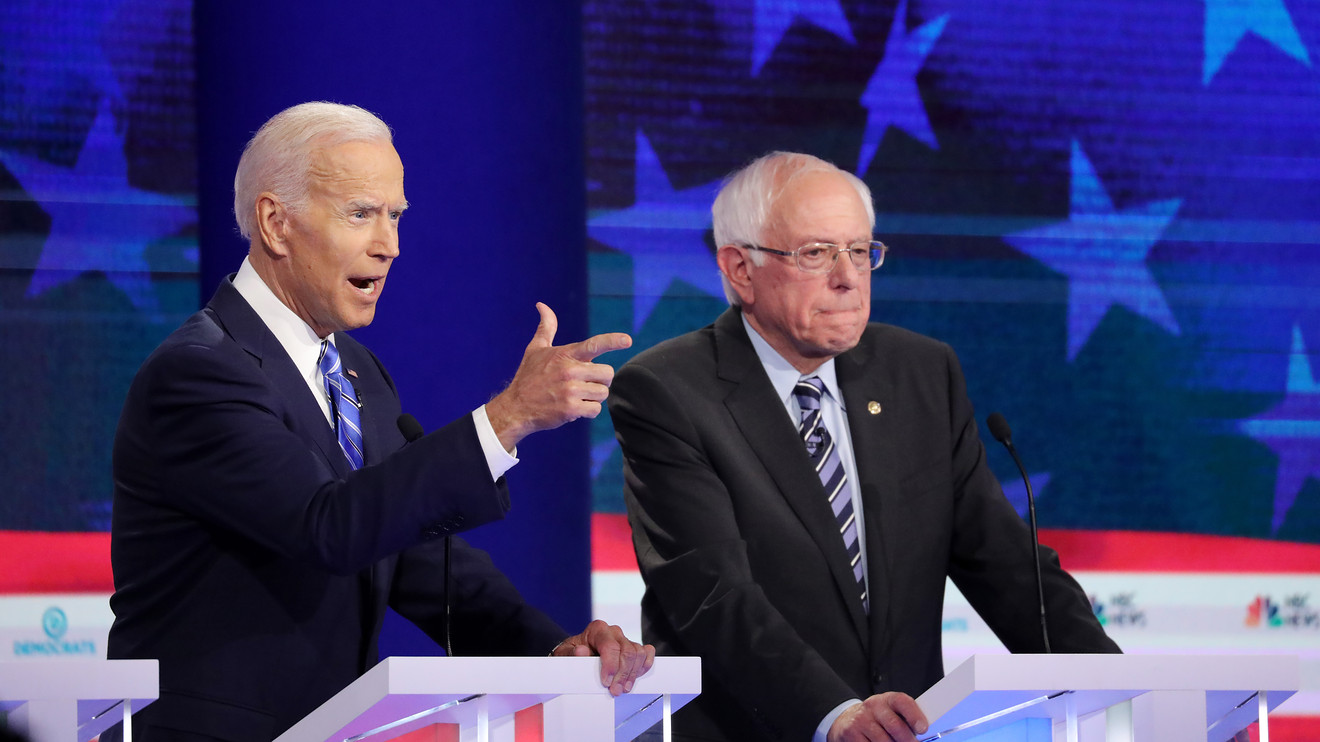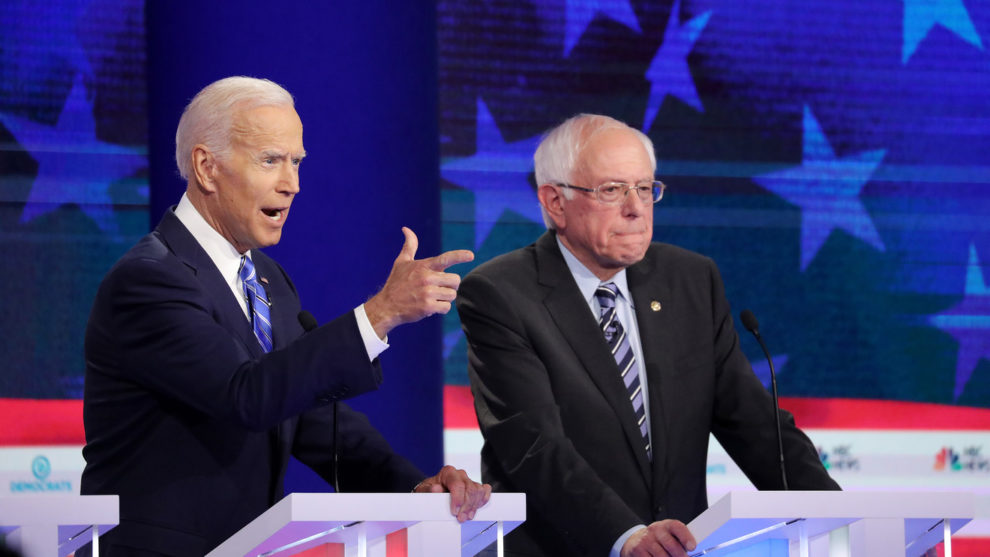
As the novel coronavirus continues to spread through U.S. communities and jolt financial markets, the leading 2020 presidential contenders have criticized the federal government’s response and laid out their own plans for how they would address pandemics like COVID-19.
The coronavirus was this week declared a pandemic by the World Health Organization. It had infected over 127,800 people globally and killed over 4,700 as of Thursday, according to data from Johns Hopkins University’s Center for Systems Science and Engineering, and over 68,000 recoveries. The U.S. had over 1,300 confirmed coronavirus cases and at least 38 deaths.
President Trump on Wednesday announced a ban on travelers from Europe, which officials later clarified would exclude U.S. citizens and legal permanent residents and their families. He also backed paid sick leave for workers impacted by what he called a “foreign virus,” called on Congress to move on payroll tax relief, and said that testing capabilities were “expanding rapidly.”
Last week, he signed into law an $8.3 billion emergency-spending bill that would fund vaccine development and aid state and local efforts, outstripping the $2.5 billion his administration had previously requested from Congress.
The Trump administration in January also declared the novel coronavirus a public-health emergency and said that foreign nationals who had been in China within the previous two weeks would be denied entry into the U.S., despite some public-health experts’ criticism of such travel bans. Returning U.S. citizens who had traveled in the past 14 days to China’s Hubei province, where the virus originated, would also be subject to a quarantine, the federal government said.
But the Democrats vying to replace Trump argue they would do a better job of protecting Americans from such threats. Here’s what the leading 2020 candidates say they would do about infectious-disease outbreaks like COVID-19:
Joe Biden
The former vice president, who led in the Democratic primary delegate count as of Thursday, released a detailed blueprint Thursday afternoon for combating coronavirus and future global health threats as he sharply criticized the Trump administration’s response. Biden called for ensuring widespread and free coronavirus testing; boosting federal resources and creating a “state and local emergency fund”; and eliminating cost barriers to preventive care, treatment and an eventual vaccine.
“Let me be crystal clear: the coronavirus does not have a political affiliation,” Biden said in prepared remarks. “It will infect Republicans and Democrats alike. It will not discriminate based on national origin, race, gender, or zip code. It will touch people in positions of power and the most vulnerable in our society.”
His plan also proposed creating an emergency paid-leave program for workers impacted by COVID-19, as well as a permanent paid sick-leave plan; giving small businesses access to interest-free loans; establishing at least 10 mobile testing sites per state, as well as drive-through testing centers; preparing hospitals for an influx of patients; and restoring the National Security Council’s global health security office, which Trump eliminated in 2018. He accused the Trump administration of a “colossal” failure on coronavirus testing.
“I offer it as a road map, not for what I will do as president 10 months from now, but for the leadership I believe is required right now, in this moment,” Biden said of his plan. “President Trump is welcome to adopt it today.”
Trump campaign spokesman Tim Murtaugh responded in a statement that Biden had “shown terrible judgment and incompetence in the face of public health issues” in the past.
“In times like this, America needs leadership and Biden has shown none,” he said. “President Trump acted early and decisively and has put the United States on stronger footing than other nations. His every move has been aimed at keeping Americans safe, while Joe Biden has sought to capitalize politically and stoke citizens’ fears.”
Bernie Sanders
The independent Vermont senator also delivered remarks on coronavirus Thursday, arguing that all health care related to the disease, vaccine included, should be free. He called for emergency funding for paid family and medical leave, boosting testing capabilities, and expanding community-health centers and primary health-care capabilities. He also advocated for unemployment compensation, ensuring access to nutritious food, constructing emergency homeless shelters and providing small- and medium-sized businesses with emergency lending.
“It is an absolute moral imperative that our response — as a government, as a society, as business communities, and as individuals — meets the enormity of this crisis,” Sanders said. “Unfortunately, in this time of international crisis, the current administration is largely incompetent, and its incompetence and recklessness has threatened the lives of many people.”
In response, Murtaugh called Sanders “the wrong prescription for fighting an outbreak like the coronavirus” and said he advocated for “a government takeover of healthcare, which would close hundreds of rural hospitals.” “He’s just another Democrat candidate for president trying to score political points by recklessly provoking anxiety and fear,” he said.
How former Democratic candidates said they would combat infectious diseases
The Democratic field has thinned in recent weeks, with former South Bend, Ind., Mayor Pete Buttigieg and Sen. Amy Klobuchar of Minnesota dropping out to endorse Biden. Former New York Mayor Mike Bloomberg quit the race to boost Biden after a disappointing Super Tuesday finish, while Sen. Elizabeth Warren of Massachusetts ended her campaign a day later, but did not immediately throw her support behind one of the remaining candidates.
Here’s what the previous leading contenders said they would do about diseases like COVID-19:
Elizabeth Warren
True to her campaign slogan, the Massachusetts senator had a lengthy plan for “preventing, containing and treating infectious disease outbreaks at home and abroad.” Released in late January, the plan criticized Trump for proposing substantial spending cuts to “federal programs essential to health security” and eliminating the National Security Council’s head of global health security, among other actions.
Warren proposed fully funding agencies that work to prevent and manage outbreaks, including the CDC, HHS, U.S. Agency for International Development and State Department. She called for restoring the global health security position; investing globally in developing vaccines; fully funding the Global Health Security Agenda, which works to bolster nations’ public-health infrastructure; and establishing a “global health security corps” made up of scientists, doctors and aid workers to respond to outbreaks in conflict-stricken areas.
She said she would also create a “swear jar” requiring law-breaking drug companies to pay a fraction of profits from publicly funded research to the National Institutes of Health to expand research for vaccine development and infectious-disease treatment, she said. And she would work to reduce the transmission of infectious diseases like HIV and hepatitis C in the U.S.
Warren’s infectious-diseases plan also incorporated other aspects of her platform, including transitioning to a government-run Medicare for All health-care system, ending the opioid epidemic and combating climate change. “A changing climate means infectious diseases will spread to new places, and it’s already happening,” she said.
Amy Klobuchar
Klobuchar released a formal plan in late January, with her campaign writing in a Medium post that “the recent outbreak of a new strain of coronavirus is a stark reminder of the persistent threats posed by infectious diseases.” “Senator Klobuchar believes the United States must continue to lead the global fight to prevent, detect and respond to pandemics,” the post said.
Klobuchar, like Warren, would recommit the U.S. to the Global Health Security Agenda. She would work with allies to boost “local health infrastructure in at-risk countries and regions,” her campaign said, and fully fund U.S. agencies, departments and programs that prevent and respond to disease outbreaks, including the HHS, CDC, NIH and State Department.
The senator would also bolster early-warning systems to detect and address outbreaks before they spiral to pandemic status, grow stockpiles of existing vaccines, invest in producing new vaccines, and build the global rapid-response system for deploying medical personnel for disease-outbreak response.
Mike Bloomberg
The billionaire businessman also criticized Trump’s coronavirus response during the last Democratic debate.
“The president fired the pandemic specialist in this country two years ago, so there’s nobody here to figure out what the hell we should be doing,” he said. “He had defunded Centers for Disease Control, CDC, so we don’t have the organization we need. … As you see, the stock market is falling apart because people are really worried and they should be.”
Bloomberg also tweeted Jan. 24 that “the coronavirus outbreak demands our attention,” sharing a New York Times op-ed about how the government should respond.
“With any potential epidemic, our first line of defense are the public health professionals at the CDC — and that’s why it’s important to make sure they are always funded and empowered to do their jobs,” Bloomberg wrote on Twitter TWTR, -14.44%.
Pete Buttigieg
The former mayor mentioned the coronavirus while answering a debate question about foreign policy.
“Right now, some of the biggest threats that we face are not only things like counterterrorism but issues like global health security and the coronavirus, that rely on the ability to listen to scientists, listen to your own intelligence and coordinate with an international community that this president has alienated because his idea of a security strategy is a big wall,” he said.
This story was originally published Feb. 25, 2020, and has been updated.





